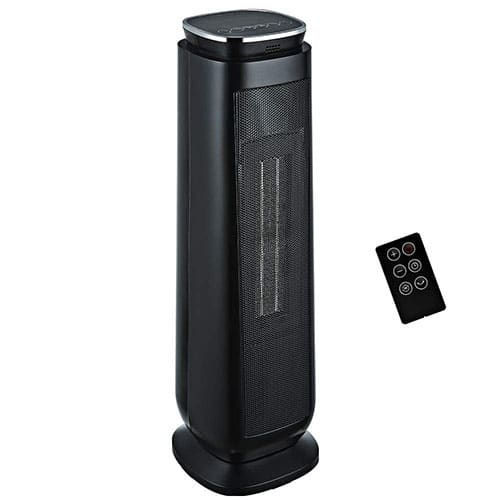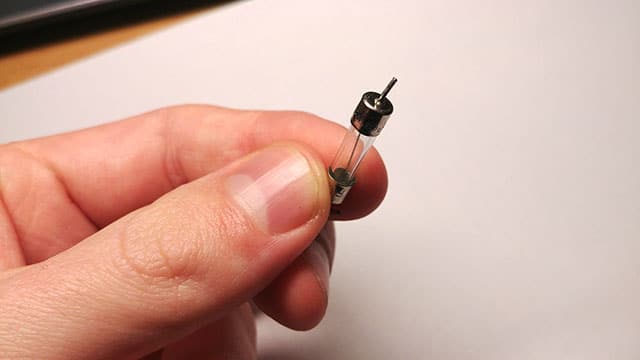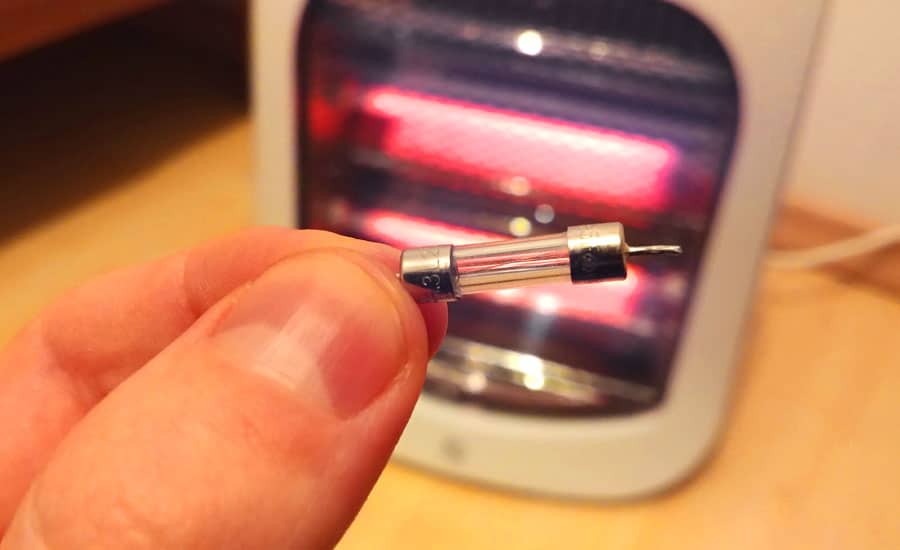Space heaters that don’t blow fuses: Is that even possible? Of course, it is!
In this article, we’re going to take a look at 5 space heaters that definitely don’t blow any fuses.
I’m an electrical engineer and carefully selected each of them and their potential to blow a fuse.
The 5 space heaters listed below are perfectly safe because they either need less power than other space heaters or they have variable power settings and various safety features.
Such heaters are useful if you absolutely need to make sure your fuses stay safe:
For example when you’re living in a student’s dorm, when you live together with other people or when you just want to avoid the hassle to do the repair work of a blown fuse.
Space Heaters that don’t blow fuses: Our Recommendations
- 1000W Ceramic Space Heater (click here to view it amazon) – This small ceramic heater is absolutely perfect to place on your desk or on the floor to keep your feet warm in the cold time. The best thing about it is, in my opinion, the price and the design.
It neatly fits in any place and doesn’t have the typical heater look.
This ceramic space heater is safe for your fuse because it uses 30% less power compared to other space heaters.
However, this also means it produces 30% less heat… - Pelonis Space Heater (click here to check the price on amazon) – This more powerful (but still safe) heater heats up quickly and I’ve found that it provides heats about instantly.
“I always run it when I go to the shower, so nice to get out to a warm room! Works fast and heats the room just right!”
I think it’s a great bang for your buck for only around 40$. - Pelonis Oil-filled Radiator with built-in thermostat (click here to view it on amazon) – If you’ve spent some time on this website before, you’ve probably noticed that I recommend the Pelonis oil heater in about every space heater safety article.
Why?
Because it has so many safety features, like tip-over protection, overheat protection, built-in timer, thermostat, remote control and everything that you wish for in a space heater.
And on top of that, it is ETL safety certified!
The Pelonis space heater will never blow a fuse. - Lasko Tower Heater (click here to check the price on amazon)
This indoor space heater is a great choice for you, because it has several power modes:
You can decide for 1500W, 1000W and ECO mode. As long as you use the 1000W setting or the ECO mode, your fuse will stay 100% safe. - Pelonis Tower Heater (click here to check the price on amazon) – Even though this tower heater runs on 1500W, it has a built-in ECO mode that you can use if you want to stay safe and keep your fuse intact.
It also has overheat protection.

Why do space heaters blow fuses?
Quick Answer: Space heaters blow fuses because of their high power consumption. When you plug them in an electric circuit like an outlet, and the circuit doesn’t have enough reserve capacity to power the heater, a fuse blows to protect other devices from damage.
Longer answer:
Space heaters need a lot of power. Most of them need about 1500W to be exact.
When you plug in a space heater together with some other devices, they will exceed the amount of power your circuit can deliver.
Because of that, the fuse will overload and break. Or a safety switch will get triggered.
But that’s a good thing.
A fuse blows because if it didn’t, an accident would happen.
Fuses protect your house from electric accidents like overheating cords or power fluctuations that would damage electric devices in your home.
Your house power supply consists of several circuits. And each of these electric circuits can deliver only a certain (limited) amount of power.
If you surpass the threshold of power your circuit can deliver, a fuse will blow to protect other devices in the circuit.
You could, for example, surpass the power threshold by plugging in a space heater together with other devices in a power strip (don’t do it).
The connected devices will draw so much power that big currents will flow through the cords and potentially damage something.
That’s where a fuse comes into play.
Let me explain how fuses work.

What is a fuse and how does it work?
“A fuse or a circuit breaker automatically disconnects a circuit from the electric power the moment more current is drawn than its design allows.”
NASA archive: Fuses and Electric Shock
A fuse is very simple:
It’s nothing more than a thin metal strand.
The whole current of a circuit flows through it. When the current increases, the strand heats up.
And because a fuse is so incredibly thin, it is very sensitive to heat, meaning that it will melt very fast.
But why does it get hot in the first place?
Current consists of a huge amount of electrons, small loaded particles, that move slowly through an electric circuit. The higher a current is, the more electrons will flow through the wires.
Wires consist of metal atoms that conduct the electricity. Between these metal atoms, there’s lots of empty space.
Now let’s have a small thought experiment:
What would happen if we had an incredibly low current of just one electron?
Answer: The electron would move through the wire without bumping into any metal atoms – it moves freely.
However, what happens if the current increases and we have a crowd of electrons moving through the wire?
Then, lots of electrons would crash into the metal atoms and shake them.
The metal atoms will start to vibrate: They heat up.
Now, the fuse is that thin metal wire.
When too high current flows through it, it will overload, heat up quickly and blow.
“In short, a fuse is nothing more than a controlled failure.”
Steeven – an engineer and author
Whenever a fuse blows don’t be angry about it. Rather be thankful for it. The protected your home from serious damage.
How do you know the 5 space heaters don’t blow fuses?
The space heaters I picked and recommended in the first section of this post are sure-fire heaters that will not blow any fuses.
Of course, that also depends on your usage, but they are comparably safe (Later on, I’ll show you how to use space heaters to avoid blowing fuses).
Actually, there’s just one single reason that guarantees that a space heater won’t blow a fuse:
- Space heaters that run on low wattage are less likely to overload an electric circuit. Thus they are way safer than high power space heaters.
Fuses often blow when several high power devices are plugged in the same circuit.
If you have a desktop pc and space heater plugged in at the same time it could be enough to blow the fuse.
By reducing the power of a space heater from 1500W to 1000W you effectively increase the buffer and make overloading less likely.
Therefore the above-recommended space heaters don’t blow fuses – they consume less power and keep a circuit safe
generally, all space heaters are safe – but they blow fuses mostly when you combine them with other electrical devices.
A high power space heater might be fine, but as soon as you turn a lightbulb on, the fuse will blow.
3 Space heater tips to avoid blowing fuses (from an electrical engineer)
Here are 3 space heater tips to avoid blowing fuses:
- Unplug other devices that you don’t need while you run a space heater.
- Don’t use an extension cord. Extension cords (especially the cheap ones) can catch fire and decrease the efficiency of your space heater. They can also increase the amount of power your space heater pulls from the circuit. Click here for the full guide on why you shouldn’t use an extension cord with a space heater.
- Run the heater on low power settings. Most heaters have an option to switch between 1500W, 1000W and 750W. Make use of it and decrease the wattage whenever you don’t really need all the heating-power.
If you keep these 3 rules in mind and follow them whenever you use a space heater, I’m 100% sure, you will never have a blown fuse again.
Does more wattage mean more heat?
Yes, according to the laws of physics, you can only get more heat with higher wattage.
In fact, you are sacrificing heat for safety when it comes to reducing the amount of power a space heater consumes.
Less power means increased safety, but for the cost of less heat.
I’m constantly running an 800W infrared heater in my room and I must say that it is definitely enough for my bedroom, but not enough to heat an entire living room.
Therefore, if you want to have a heater that is powerful and can replace a radiator, you can only make sure your fuse stays safe by making sure you don’t use other high wattage devices together with your space heater.
Conclusion – Space Heaters that don’t blow fuses
Space heaters that don’t blow fuses are always heaters that consume less power to run.
Efficient heaters drain less current and therefore make sure that your fuse stays intact.
If you get one of the above-mentioned space heaters, you can be absolutely sure your fuses will stay safe as long as you additionally follow the 3 tips.
I hope, this article could point you in the right direction for choosing your heater!

